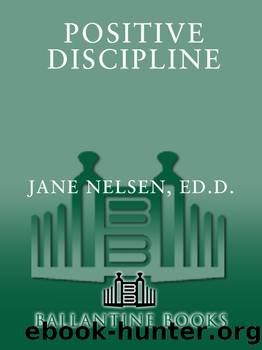Positive Discipline by Jane Nelsen Ed.D

Author:Jane Nelsen Ed.D. [Nelsen Ed.D., Jane]
Language: eng
Format: azw3
ISBN: 9780307794161
Publisher: Random House Publishing Group
Published: 2011-05-24T16:00:00+00:00
ENCOURAGEMENT VERSUS PRAISE
For many years there has been a great campaign for the virtues of praise in helping children gain a positive self-concept and improve their behavior. This is another time when we must âbeware of what works.â Praise may inspire some children to improve their behavior. The problem is that they may become pleasers and approval junkies. These children (and later these adults) may develop self-concepts that are totally dependent on the opinions of others. Other children resent and rebel against praise, either because they donât want to live up to the expectations of others or because they fear they canât compete with those who seem to get praise so easily. Even though praise may seem to work, we must consider the long-term effects. The long-term effect of encouragement is that it invites self-confidence. The long-term effect of praise invites dependence on others.
As discussed earlier, another mistake adults have made regarding praise is the notion that they can âgiveâ a child self-esteem. Self-esteem canât be given or received, it is developed through a sense of capability and the self-confidence gained from dealing with disappointments, solving problems, and having lots of opportunities to learn from mistakes. The successful use of encouragement requires adult attitudes of respect, interest in the childâs point of view, and a desire to provide opportunities for children to develop life skills that will lead to self-confident independence from the negative opinions of others. Some characteristics of both praise and encouragement are outlined below.
The differences between encouragement and praise can be difficult to grasp for those who believe in praise and have seen immediate results. They have seen children respond to praise with beaming faces. However, they donât think about the long-term effects of dependence on the opinions of others. Even those who want to change from praise to encouragement find it awkward to stop and think before making statements that have become habitual.
It may help to keep the following questions in mind when wondering whether the statements you make to children are praise or encouragement:
Am I inspiring self-evaluation or dependence on the evaluation of others?
Am I being respectful or patronizing?
Am I seeing the childâs point of view or only my own?
Would I make this comment to a friend?
Download
This site does not store any files on its server. We only index and link to content provided by other sites. Please contact the content providers to delete copyright contents if any and email us, we'll remove relevant links or contents immediately.
100 Simple Secrets of the Best Half of Life by David Niven(147)
Positive Discipline by Jane Nelsen Ed.D(134)
75 Balance Exercises for Seniors by O'Donnell Sean(121)
Fast Living, Slow Ageing by Kate Marie(92)
The Courage to Grow Old by Barbara Cawthorne Crafton(84)
Healing Your Grief About Aging : 100 Practical Ideas on Growing Older with Confidence, Meaning and Grace by Alan D Wolfelt; Alan D Wolfelt; Kirby J. Duvall(83)
The Ninth Decade by Carl H. Klaus(76)
Grief's Second Mile: Beyond the First Year by Doug Manning(73)
Generation Squeezed by Morgan H Smith Jr(69)
Experience Human Development by Diane Papalia Gabriela Martorell(65)
Neuroscience and Christian Formation by Mark A. Maddix; Dean G. Blevins(59)
Healthy Aging For Dummies by Brent Agin and Sharon Perkins by Unknown(56)
